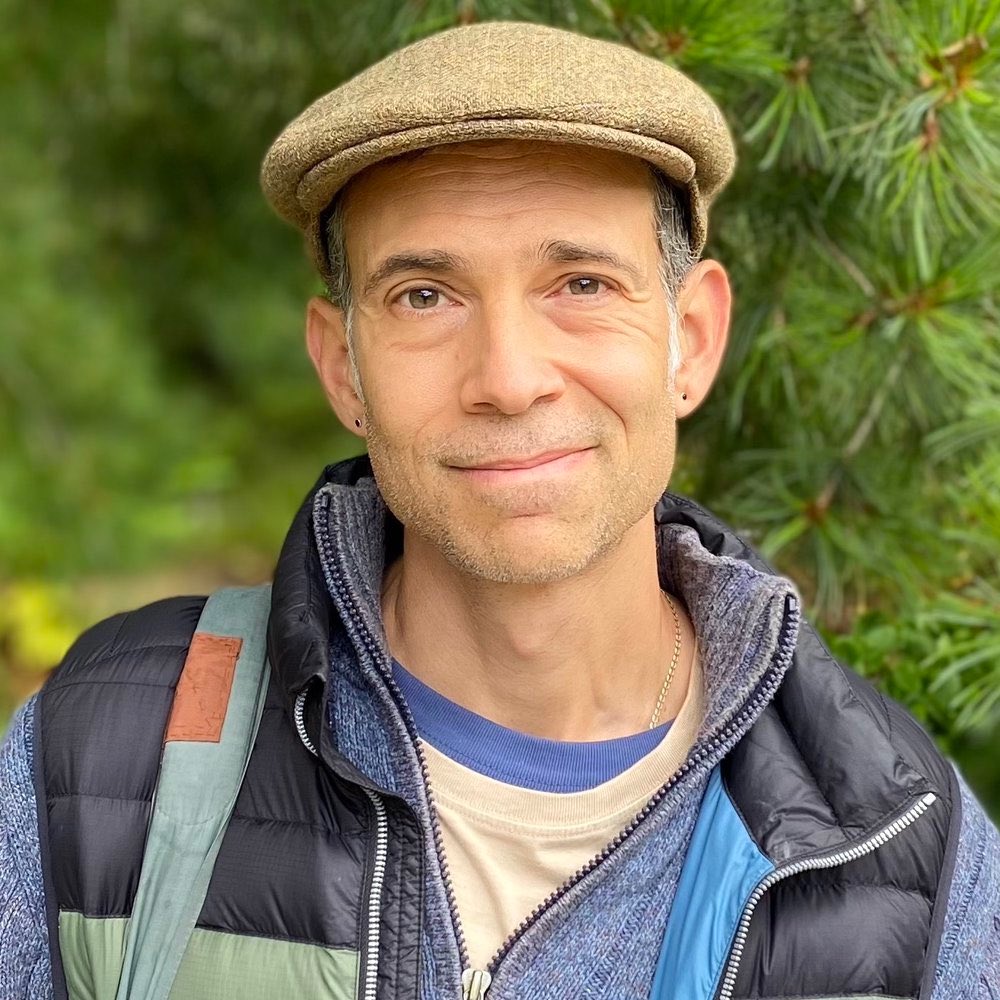by Oren Jay Sofer for Waging Nonviolence
In the face of deep suffering in our world, joy strengthens our spirits so we can sustain courageous action.
The following is an excerpt from “Your Heart Was Made for This: Contemplative Practices for Meeting a World in Crisis with Courage, Integrity, and Love.”
I grew up on the East Coast, where forests of evergreen, oak and maple soothed me. I loved spending time in a great old white pine. I’d climb into her arms, as high as her branches would support me. Near her crown, I would wrap one arm around her trunk and look out over the trees. When the wind picked up, the great tree would sway gently, rocking me in her arms. Her sap stuck to my skin for days, reminding me of the vast, quiet space she gave me, near the sky.
Just as a plant withers without adequate water, our hearts lose buoyancy and brightness without joy. Doing work — especially the work of service and social change — requires both external and internal resources. We need resilience to face pain, strength to persevere through challenge and joy to lift the heart.
Joy is a feeling of great pleasure, characterized by satisfaction and deep connection to self, other and the moment. Joy comes in many forms: from a quiet, contented happiness to a rush of warmth, to waves of pleasure. Joy may spring from personal circumstances, from the happiness of others and even from deep presence.
We experience joy in countless ways. My heart lifts seeing our son laugh; my heart warms recalling my childhood dog, furiously wagging her tail. Joy has roots deep in our biology: puppies and kittens play with infectious joy; dolphins leap with delight. To be touched by life, we must be willing to let it in — to open and receive. This receptivity emerges naturally when we slow down as I did, held in the arms of that pine: when we close our eyes, feel the sun on our face, or lean in to smell a flower.
Though joy is innate, conditions complicate our ability to access it. The author and neuroscience educator Sarah Peyton notes that our nervous system only experiences joy and play when we feel valued and safe. Trauma, violence and structural oppression rob us of joy by depriving us of these needs. Ongoing grief or marginalization alienates us from joy. After significant loss, we may need time before feeling joy again. Mourning requires feeling grief, rather than papering over hurt with false well-being.
Train yourself to enjoy small moments of beauty and goodness in life: a flock of birds overhead, sunlight cutting through a window and shimmering on a glass of water, ordinary time with a loved one. How much joy do we miss in life because we’re moving too quickly? If your life feels overwhelming — perhaps raising children or working multiple jobs to make ends meet — acknowledge that you face external challenges. In this way, you might create more internal space. By honoring the pressures you experience, you may find renewed capacity to open to joy.
When my friend Miki and I walk together, we begin by taking turns sharing things we want to appreciate or celebrate, building our capacity for joy. In his work on resilience, Rick Hanson offers a two-part process called “taking in the good.” He invites us first to notice something nourishing, beautiful or uplifting (or invoke it through memory or imagination), then to linger with that experience for at least 20 seconds. This nourishes us somatically, creating new neural pathways, etching the quality into our brains, and making joy easier to access in the future.
Beware of two traps along the path to joy. One trap equates contemplative practice solely with calm, peace or pleasure. This trap, common in secular mindfulness practice, leads us to avoid anything heavy or painful or to put a falsely positive spin on every experience. The second trap, more common in Buddhist circles, associates spirituality with seriousness and suffering. We may fear healthy pleasure, disengage from life or avoid joy, worried it will stir cravings. In fact, contemplative practice neither cuts us off from the world nor suppresses anything. It teaches us to feel all of life, hard and joyful, suffering and celebration. The Bible teaches that there is a season for everything: sorrow is the shadow that brightens our joy.
We suffer deeply in our world. Experiences of profound isolation, news of hate crimes or police violence, the spread of war, failure to act on the climate crisis — these take a toll on our hearts. Sometimes I read the news and weep. In the face of suffering, joy nourishes the heart so we have the resilience to open to pain and anger, feeling them, rather than shutting down or turning away. Joy creates space so we may respond to difficulty with skill. Joy strengths our spirits so we can sustain courageous action.
Consider the Black civil rights movement, which resounded with uplifting songs of joy for years. In the midst of struggle, the movement for Black freedom consistently celebrated the collective joy of acting wholeheartedly in a noble cause. The sustaining power of joy rings through the life and writings of the formidable anarchist and feminist activist Emma Goldman, whose work connecting sexual liberation, creativity and social revolution has been paraphrased in the popular slogan, “If I can’t dance, I don’t want to be part of your revolution.”
Joy protects the heart and nourishes courage. The author and social justice leader adrienne maree brown argues, “Joy is important. It’s not a guilty pleasure, it is a strategic move towards the future we all need to create. One in which our children are laughing, our children are free.”
Joy is sweeter when shared. Consider how good it feels to rejoice in a friend’s unexpected good news. When the heart is open, it’s natural to celebrate another’s good fortune. Years ago, a friend sent me a video of their toddler in little pink boots, puddle-jumping in the rain, and I still smile, remembering it! I’ve been moved to tears by couples’ figure skating. Envisioning the long years of training, we can join in their joy and pride as they execute an impeccable routine.
Of course, it’s easier to feel happy for others when we don’t covet what they have. (You’re unlikely to happen across me in a televised figure-skating competition anytime soon.) Do you contract a little when others succeed? Jealousy blocks appreciative joy, inhibiting our celebration. We may compare ourselves to others, judge them or think cynically, “I’d feel better if you weren’t so darn happy!” We may think happiness is a limited resource: the happier you are, the less happiness for me.
Thankfully, appreciative joy dispels such notions, recognizing envy but discovering that our hearts are big enough for it all. We can celebrate others and still pursue our goals. As the Dalai Lama has quipped, “When you count other people’s happiness as your own, you have billions more chances to be happy.” Cultivating appreciative joy dissolves the boundaries between self and other. Your happiness becomes mine and we enter an expansive, interconnected space.
Opening to joy, you may encounter a new challenge: feeling its fullness. Despite the collective heartache of the past few years, I’ve also known tremendous joy. After eight years of partnership with Evan, I felt overwhelmed by joy in the weeks leading to our wedding. The prospect of standing before our community and taking vows connected me with the depth of my love for her and devotion to my path. I worked to expand my capacity to feel that joy. I spoke with friends, explored my thoughts and feelings, and created a larger container for joy by relaxing and breathing. When I finally stood at the altar before Evan, our family and friends, I felt solid, clear and open. In turn, this experience prepared me to welcome our son into this world with a full, strong heart.
Connecting with life as it is — blessings and hardships, alike — brings deep joy. This joy does not depend on getting what we want. Feeling the full range of human experience — the joy and the sorrow — ennobles the heart. It’s not what we experience but how we relate to it that frees us. When we engage all of our being, we encounter a holistic satisfaction. When we are open, curious and kind toward all that arises in us, the sincerity of our presence offers its own reward: the joy of connection to truth.
Action
Every morning for a week or more, set an intention to notice small moments that nourish you or bring you joy. Slow down. Taste your food. Notice the flowers or trees. Look at the sky. Call a friend. Spend time in nature and allow your heart to be touched. Begin by noticing what is uplifting, letting it register in your heart. Then let your attention linger there. How does this experience feel in your body? Soak in any sensations of happiness or pleasure, however subtle.
If you have difficulties
You can’t force joy or control its presence. In the face of grief or stress, joy may not be appropriate. Honor your feelings, inviting tenderness toward your experience. Explore the difference between resisting your feelings — fighting, fearing or avoiding them — and allowing yourself to open to them. How does it feel to accept an emotion even a little? Notice any movement from contraction toward well-being or ease. Relax into that shift; savor it, though it may be small. Consider that this could be a kind of bittersweet joy, the joy of knowing the truth.
If you feel stuck or low, engage your imagination. Not as an attempt to escape the present, but as a way to nourish your heart and bring more inner resources to what you are facing. Recall a time you felt well. Imagine a person or place that brings you joy. Let this become clear in your mind’s eye, noticing as many details as you can. Absorb the goodness of this memory. When you’re ready, let this image fade, but retain its nourishment. Bring this back into your present circumstance: the seed of joy is already within you.

Oren Jay Sofer
Oren Jay Sofer teaches mindfulness, meditation and nonviolent communication in secular and Buddhist contexts. He is the author of “Your Heart was Made for This,” and “Say What You Mean: A Mindful Approach to Nonviolent Communication.” You can learn more about his work at orenjaysofer.com
Oren Jay Sofer
Oren Jay Sofer teaches mindfulness, meditation and nonviolent communication in secular and Buddhist contexts. He is the author of “Your Heart was Made for This,” and “Say What You Mean: A Mindful Approach to Nonviolent Communication.” You can learn more about his work at orenjaysofer.com


